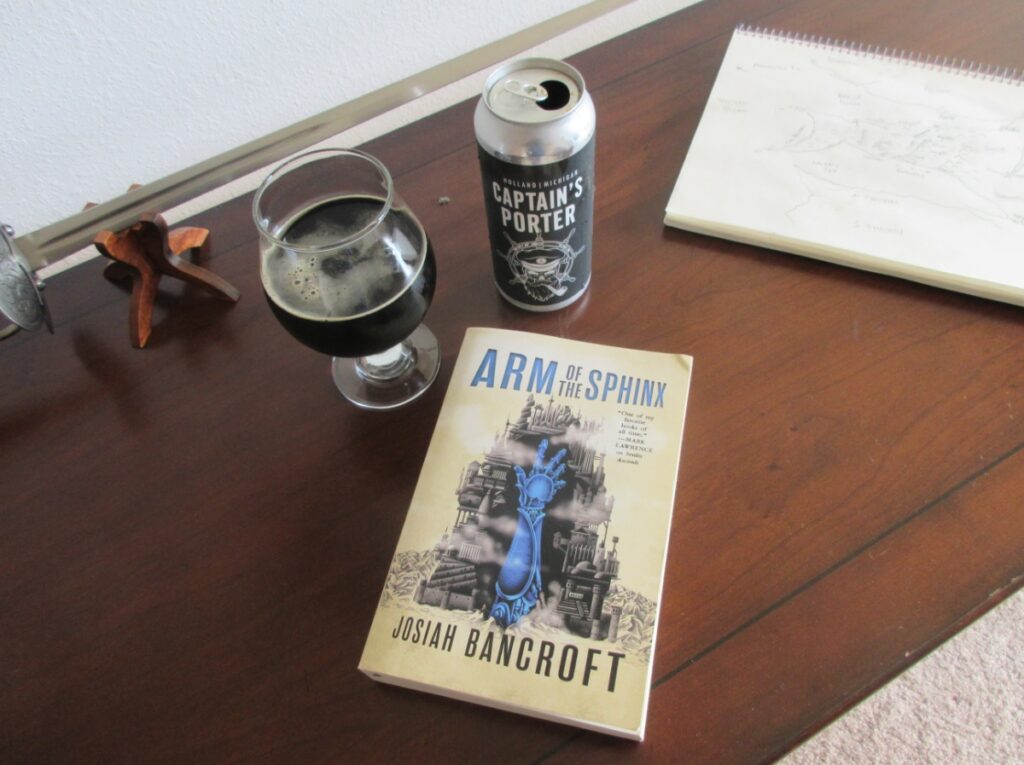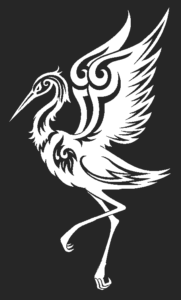Arm of the Sphinx by Josiah Bancroft
 …wait, is that a spider?
…wait, is that a spider?
Arm of the Sphinx is the second, much more firmly steampunk installment in Josiah Bancroft’s brilliant Books of Babel series, and represents a kind of inflection point in Thomas Senlin’s journey. What began as a quest to find his lost wife Marya among the vast, labyrinthine Tower of Babel has wrought changes in him that he doesn’t like, but will not let deter him. After escaping the ruthless Commissioner Pound and other baddies, Senlin and his small crew of misfits take up their new cover identities as airship pirates in order to gain access to the ringdom of Pelphia, where Marya is likely located.
During this attempt, the crew must make contact with a supposed revolutionary, dodging pirate coves clinging to the Tower like barnacles, cannonfire from all directions, and swarms of massive spiders. The cost of this audience requires Senlin to turn to true piracy, robbing almost-innocent people to gather sufficient loot. When the powerful clockwork arm of his first mate (whom we’ve met previously) breaks down during all this action, they must seek out repairs from the enigmatic, almost mythical entity near the top of the Tower known as the Sphinx who, it is warned, will extract a heavy toll for such services.
The plot also further reveals the origins of the Tower, if it even is a Tower at all. Senlin’s ability to make enemies everywhere he goes and yet still persevere draws the eye of the Sphinx, who decides he could be quite a useful asset in an ancient scheme to put the true purpose of the Tower in motion. And we finally get to find out what that freaking painting is all about!
Any further discussion of the plot would be spoilers, but the main issues dealt with in this volume are how far Senlin will go to achieve his goal, what it will do to him, and what kind of person will his wife find even if he does. I was reminded of a line from Boardwalk Empire—“You can’t be half a gangster anymore”—which well describes Senlin’s attempt to walk a line as a not-quite-pirate until things get serious. There’s really no such thing as—sorry Scott Lynch—a “gentleman bastard,” they’re just bastards, and Senlin’s acknowledgment of this is a defeat as well as a moment of growth for him. Yet, his determination not to become a permanent villain despite these admitted failings keeps him from descending into a hateable character. These notions were touched on in the first book but are front and center here. The arcs of the secondary characters are also explored, and you get the sense of a true fellowship that has formed among the crew.
It’s always tough being a middle book in an epic, and it shows a bit here. We no longer have the initial wonder of being introduced to the Tower and it’s denizens, we don’t need as much world-building, nor do we get the excitement of the final climax. Middle books often have the grunt work of moving the plot along. In this, Arm of the Sphinx excels admirably, although overall the pacing is slower. I think Bancroft knows this, as the book tries to compensate by opening with an action scene that illustrates what our characters have been up to since we last saw them. But just as Senlin becomes colder and more methodical in his planning, with less confused scrambling about, we also get a lot more navel-gazing and philosophizing that might contrast with what readers of Senlin Ascends might expect. It does pick up more in the second half, however. Another thing to watch for is the shifting POVs, where the previous book remained only in the head of Senlin. I have no problem with this style, but some readers might be thrown off a bit.
On the other hand, this book continues Bancroft’s sneaky trick of ending each chapter with, if not a cliffhanger, at least some turn or revelation that makes you want to read on, sometimes well into the night. There are a bit fewer different ringdoms with their own weird ways, but there are some, and each just whets the appetite to know what lies in the one above, and above that, and above that, etc. We do get to briefly see the very top of the Tower, but it’s a strange and enigmatic scene that leaves the reader scratching their head and thirsty to learn more about it later.
Overall, I get the sense of bread dough rising in this book, where what began as Senlin’s own personal quest takes its time to expand into something much more epic and dangerous, and which will be baked into a delicious, buttery loaf in the next books. I guess I shouldn’t write reviews when I’m hungry. In some ways, though not really plotwise, it reminds me of Dune Messiah, which serves as a bridge between the self-contained adventure of Dune to the wider saga that comes after. Next stop is The Hod King, which I already have in hand.
P.S. On a really nerdy note, I love that on the cover, the hand of the arm has an engraved outline of the seal of the Sumerian sun god Shamash, for this book about a Tower of Babel in a land called Sumer.
Josiah Bancroft’s website: TheBooksOfBabel.com
Pairs well with: Big Lake Brewing Captain’s Porter
Local craft brews can often be hit or miss because the main cachet is the local part. The perceived value add of artisinality (?) is often used to justify the price premium, so you can encounter truly awesome, innovative beers as well as boring ones with little to distinguish them. Big Lake Brewing Captain’s Porter is a middle of the road example that is neither of these, but is a satisfying choice for those of us still resisting the tidal waves of summer IPAs. This 6.5% ABV, 41 IBU porter is well balanced with toasted malt and some nice cola, nut, and smoke flavors but also some underlying herbal bitterness on the finish. It’s not nearly as thick as one might expect (or fear), with a head that evaporates quickly. It won’t knock your socks off, but neither is it a disappointment. Senlin spends most of Arm of the Sphinx as an airship captain also trying to find middle paths, so this porter seems appropriate.
